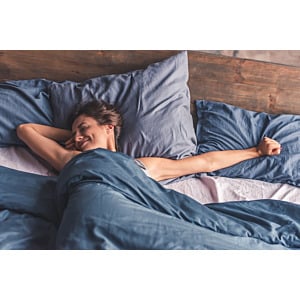Sleeping Positions to Aid Digestion
Just like the way we exercise, the way we sleep matters to our health. Your sleeping position can affect anything from your brain to your gut. Even if you’re one of the lucky few who are achieving 7-8 hours sleep per night, you may still awake without any energy. Sound familiar? Let’s reassess what happens to your body when the lights go out.
Which Sleeping Position is Best for Your Health?
Left-Side Sleeping
Sleeping on your left has the most science-backed health benefits. Our organ placement is asymmetrical internally. So how we rest influences the way our digestive systems produce and process waste.
Left-side sleeping encourages healthy bowel movement. Gravity can help shift waste through the colons while you sleep and encourage a routine trip to the bathroom in the morning.
Other benefits of side sleeping include:
- Reduces heartburn - It is theorised that if we lie on our left side, the stomach and its gastric juices remain lower than the oesophagus while we sleep, reducing the risk of heartburn.
- Boosts brain health - Compared to sleeping on our back or stomach, sleeping on your left or right side can help your body clear 'interstitial waste' from the brain. This brain cleanse may help reduce your risk of developing neurological diseases such as Alzheimer's and Parkinson's.
- Reduces snoring and sleep apnea - By sleeping on your side, your tongue is kept from falling into your throat and partially blocking your airway. However, if side sleeping does not alleviate snoring, browse our anti-snore aids here.
How to Side-Sleep Correctly
- Find the perfect pillow that fits your collarbone shape and structure
- Place a firm pillow between your knees to support your lower back and hips
- Hug a pillow to keep your arms in a comfortable position

Back Sleeping
Despite side-sleeping being the optimised position for your health, there are still many benefits to sleeping on your back, including alleviating hip and knee pain, reducing arthritis and bursitis, and relieving fibromyalgia and sinus build-up
How to Sleep on Your Back Correctly
- Sleep on a wedge pillow to relieve heartburn, stuffy nose, pressure and headaches
- Tuck a pillow under your knees to protect and support your lower back
- Evenly distribute your weight and avoid pressure on your joints by sleeping with your arms and legs spread out

Stomach Sleeping
Sleeping on your stomach is not recommended by healthcare professionals.
Certified sleep science coach, Bill Fish, warns that, "since majority of the weight of the human body is around your center, that core pushes into the sleep surface further and basically puts strain on your spine in the wrong direction, causing back and neck pain."
If you snore or suffer from sleep apnea, stomach sleeping may help to keep your airways open. However, side-sleeping is the better option.
How to Sleep on Your Stomach Correctly
- To avoid neck stiffness, regularly alternate the way you turn your head
- Try to keep your legs straight. Bending one knee will wreak havoc on your back
- Don't tuck your arms underneath your head or pillow. This can cause numbness, tingling or pain
What Else Can I Do to Improve Digestion?
Improving your sleep position isn't the only way to improve digestion. Follow our top tips for healthier, more comfortable and complete toilet visits:
- Go Better - The natural body position to defecate is in a squatted position. Our regular toilets hinder this and are bad for your health. Using a Go Better® Toilet Stool helps to raise your feet into the perfect position to mimic a squat, allowing for easier and healthier bowel elimination every time.
- Take a sitz bath - Soaking your body in an Epsom salt sitz bath is amazing for your body inside and out. The magnesium in Epsom salts acts as a natural laxative and is great for relieving constipation and strengthening your pelvic floor muscles.
- Supplement - Up to 1 in 5 of the UK population are affected by constipation. It even affects twice as many women than men! As well as boosting your immune system, supplementing Vitamin C can help to control constipation. The vitamin can help to pull water into your intestines which can help to soften your stool.
- Drink up - Drinking fluids and consuming foods that contain water aids digestion. Water is necessary to help you digest soluble fiber, which helps the bowel to produce soft stools that are easy to pass.
Sources
[1] Jennifer Chesak (2019) How These 3 Sleep Positions Affect Your Gut Health [online]. Healthline [viewed 13/11/2019]. Available from https://www.healthline.com/health/healthy-sleep/sleep-effects-digestion
[2] National Institute of Health and Care Excellence (2013) Single Technology Appraisal Lubiprostone for treating chronic idiopathic constipation Final scope [online]. NICE [viewed 13/11/2019]. Available from https://www.nice.org.uk/guidance/TA318/documents/constipation-chronic-idiopathic-lubiprostone-final-scope2
[3] Healthline (2019) 5 Vitamins That Can Relieve Constipation [online]. Healthline [viewed 13/11/2019]. Available from https://www.healthline.com/health/digestive-health/vitamins-for-constipation
[4] Lizette Borreli (2016) Benefits of Drinking Water: H20 Nourishes the Digestive System, Helps With Fluid Balance [online]. Medical Daily [viewed 13/11/2019]. Available from https://www.medicaldaily.com/health-benefits-drinking-water-digestive-system-fluid-balance-391799


